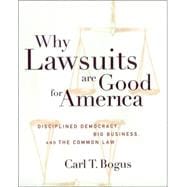
Note: Supplemental materials are not guaranteed with Rental or Used book purchases.
Purchase Benefits
Looking to rent a book? Rent Why Lawsuits Are Good for America : Disciplined Democracy, Big Business, and the Common Law [ISBN: 9780814799161] for the semester, quarter, and short term or search our site for other textbooks by Bogus, Carl T.. Renting a textbook can save you up to 90% from the cost of buying.
| Acknowledgments | xi | ||||
| Introduction | 1 | (5) | |||
| 1 Why Tell Tales? | 6 | (16) | |||
|
6 | (5) | |||
|
11 | (6) | |||
|
17 | (5) | |||
| 2 War on the Common Law | 22 | (20) | |||
|
22 | (5) | |||
|
27 | (7) | |||
|
34 | (6) | |||
|
40 | (2) | |||
| 3 The Third Branch of Government | 42 | (24) | |||
|
42 | (3) | |||
|
45 | (7) | |||
|
52 | (8) | |||
|
60 | (2) | |||
|
62 | (4) | |||
| 4 Disciplined Democracy and the American Jury | 66 | (36) | |||
|
66 | (11) | |||
|
77 | (2) | |||
|
79 | (3) | |||
|
82 | (6) | |||
|
88 | (6) | |||
|
94 | (8) | |||
| 5 The American Common Law System | 102 | (36) | |||
|
102 | (13) | |||
|
115 | (8) | |||
|
123 | (15) | |||
| 6 Who Regulates Auto Safety? | 138 | (35) | |||
|
138 | (3) | |||
|
141 | (4) | |||
|
145 | (14) | |||
|
159 | (4) | |||
|
163 | (6) | |||
|
169 | (4) | |||
| 7 The Three Revolutions in Products Liability | 173 | (24) | |||
|
173 | (11) | |||
|
184 | (6) | |||
|
190 | (3) | |||
|
193 | (4) | |||
| 8 The Common Law and the Future | 197 | (24) | |||
|
197 | (14) | |||
|
211 | (10) | |||
| Notes | 221 | (38) | |||
| Index | 259 | (6) | |||
| About the Author | 265 |
The New copy of this book will include any supplemental materials advertised. Please check the title of the book to determine if it should include any access cards, study guides, lab manuals, CDs, etc.
The Used, Rental and eBook copies of this book are not guaranteed to include any supplemental materials. Typically, only the book itself is included. This is true even if the title states it includes any access cards, study guides, lab manuals, CDs, etc.